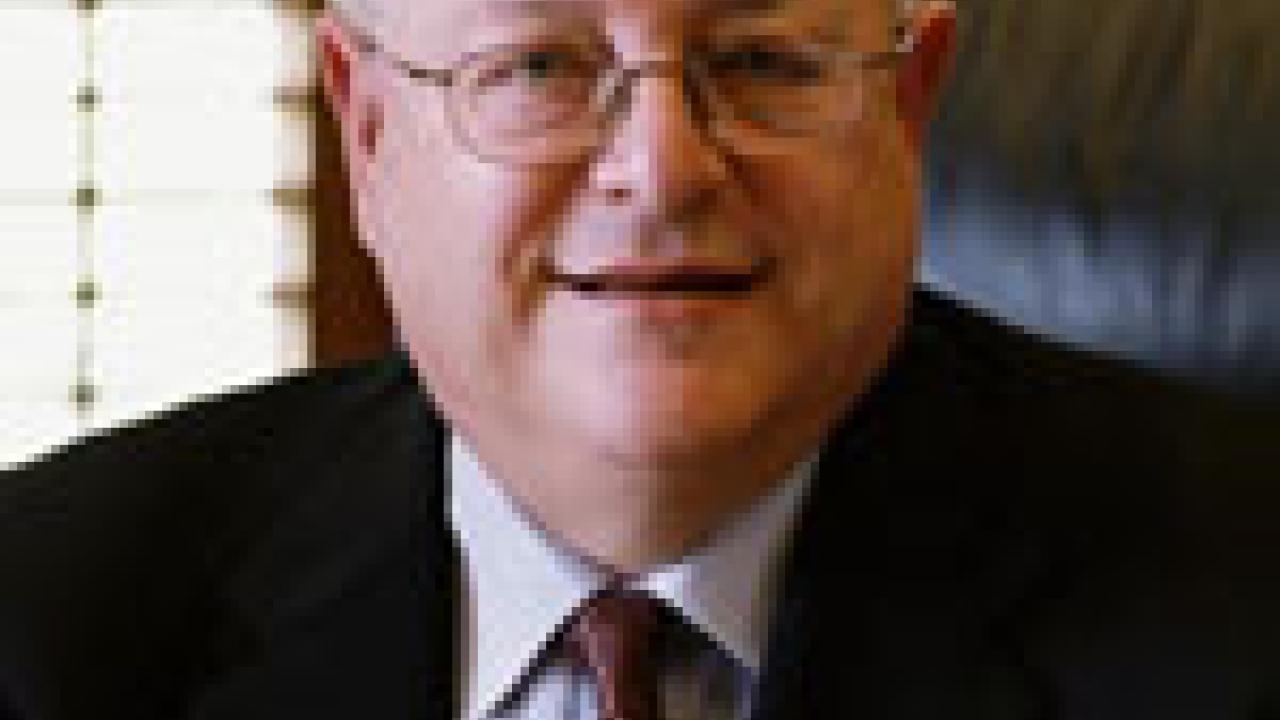UC President Mark Yudof traded insights with UC faculty on a range of issues the university is grappling with — including furloughs, retention and future planning — at an Oct. 14 meeting of the Assembly of the UC Academic Senate.
“I view my job as to preserve, protect and defend the UC in all of its unique features,” Yudof told the senate leaders. “That includes the stunningly capable faculty, access for low-income students, research and medical care. Unfortunately I’m also charged with balancing the budget. That often forces some incredibly difficult decisions.”
In a two-hour discussion with representatives from each of the 10 campuses, Yudof took the opportunity to explain his reasons for not wanting faculty furloughs, which began Sept. 1, to be taken on instruction days.
‘Partial mea culpa’
As part of an effort to close UC’s $1.1 billion budget gap, all faculty and staff are required, over a 12-month period, to take from 10 to 26 days off without pay, depending on salary range. Faculty members have been asked not to take their required days off on days they teach classes. That directive prompted some professors to stage a walkout on Sept. 24.
“This is a partial mea culpa,” Yudof said. “In general, the calendar and how many days you meet with your students is a faculty matter. Who am I to tell you how many days you should stand at the podium? Then I started hearing from families and students and legislators.”
Those groups brought up the issue of raising student fees and then cutting back on the number of instruction days. The response was so negative that Yudof said he changed his mind about allowing faculty to determine their own furlough days.
“It would be a debacle or just short of one,” he said. “It would be a real problem for the university. I didn’t want UC suffering the ill will of those populations.”
2010-11 budget
Yudof urged assembly members to support the budget he is presenting to UC Regents in November as a way to stabilize the university’s finances and have more money to recruit and retain faculty. The budget includes a state contribution for the UC Retirement Plan. Keeping the plan funded is a priority, Yudof said, and essential to attract and retain talented faculty.
The university will be asking the Legislature for more than $900 million in the 2010-11 budget, he said. The request includes $106 million to restart contributions to the UC Retirement Plan, $160 million for unfunded student enrollment, $305 million to restore one-time cuts made to UC’s 2009-10 budget and $332 million for “academic excellence.” That money would be used to restore cuts the campuses have made to things such as library hours, classes and graduate student programs.
Some assembly members questioned the wisdom of instituting differential fees for business and engineering students, a proposal regents heard during their September discussion of fee increases.
“We have over 50 percent first-generation college students — neither parent has a degree,” said UC Merced engineering professor Martha Conklin. “They are majoring in science and engineering because they want practical degrees.”
Conklin said she didn’t want to discourage them from pursuing engineering degrees because the fees were higher.
After testing the waters for differential fees, Yudof said, he had removed that option from the fee increase proposal Regents will vote on in November. At the same time, he said, he didn’t believe students would change their major because of a differential fee.
UC Commission on the Future
Several assembly members asked for more details on the work of the UC Commission on the Future. The commission, which Yudof and UC Regents Chair Russell Gould co-chair, is examining the future direction of the university, considering new strategies for research, revenue-generation, course delivery and appropriate enrollment levels.
“Eighty years ago or more, the regents delegated to the Academic Senate authority over curriculum, admissions, recruitment and advancement of faculty,” Academic Senate Chair Henry Powell said after the meeting. “All these things are close to the focus of the commission.”
Faculty want to be sure the commission gives them a chance to react to its proposals and that those proposals are consistent with their commitment to quality, affordability and access, Powell said.
“A lot of us are wondering what kind of university will emerge from this,” UC Davis law professor John Oakley told Yudof.
“There is no sentiment at all for taking over the functions of the faculty,” Yudof said. He urged faculty members to attend the working group meetings that will be taking place on all the campuses in the coming weeks and to add their voices to the discussions.
(For more information on the commission, visit ucfuture.universityofcalifornia.edu)
“I think you do get it,” said UC Riverside biochemistry professor Tony Norman. “I wish I could transmit to faculty on the campuses that you really do get it. You should get to all the campuses. Get the troops out. It’s going to help shared governance.”
Faculty ‘horsepower’
Yudof said he is working on campus visits and asked assembly members to be advocates for UC and to rally their colleagues to do the same. Write op-ed pieces and meet with your legislators, he said.
“I need the horsepower,” Yudof said. “And only the faculty has it... . I need your participation.”
Yudof received a round of applause at the end of his discussion with the assembly.
“He did a good job,” said Powell. “We don’t normally applaud administrators. That’s a tribute.”
Donna Hemmila is a managing editor in the UC Office of the President’s Integrated Communications group.
Media Resources
Clifton B. Parker, Dateline, (530) 752-1932, cparker@ucdavis.edu
